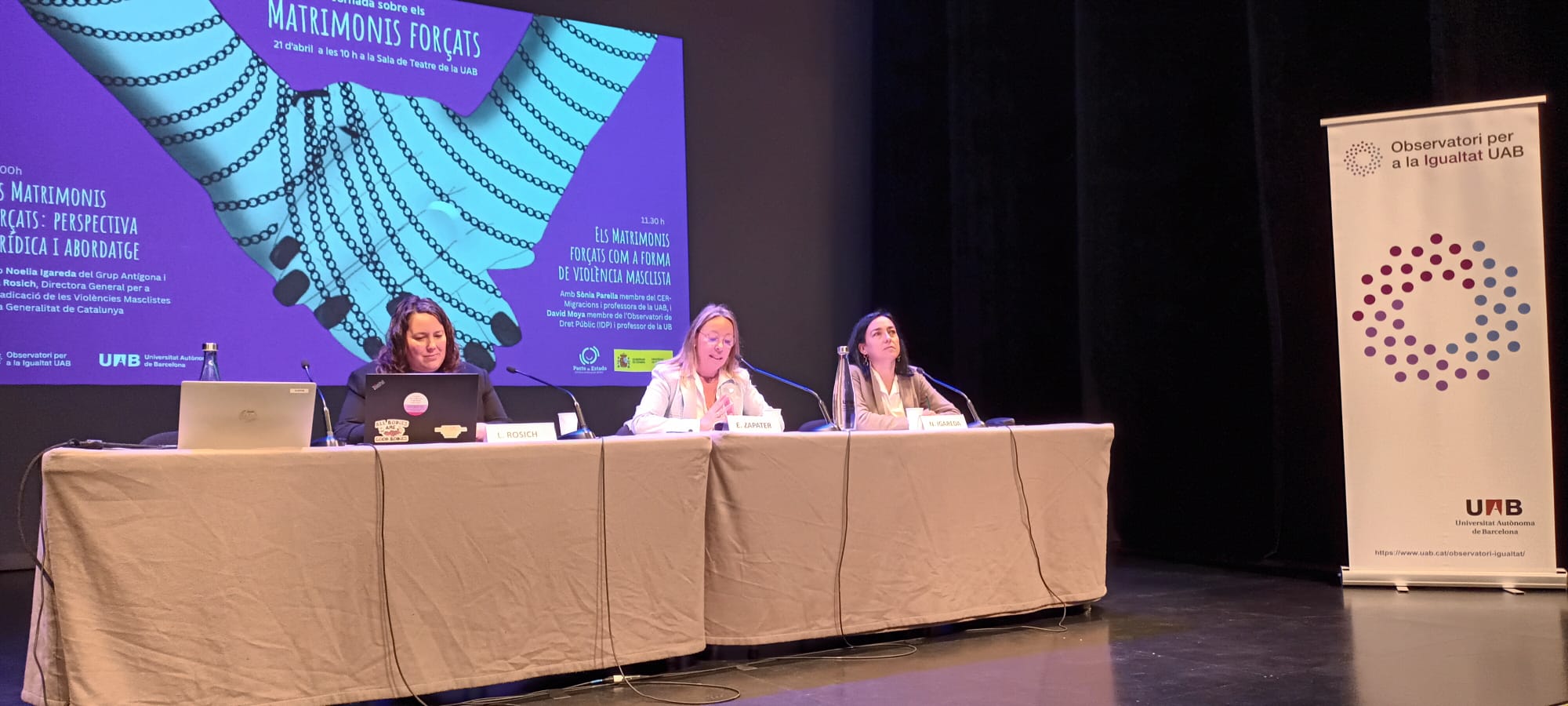Report on the forced marriage conference: all the details of the event

The Observatory for Equality of the UAB has organised an event about forced marriages at the Theatre of the UAB. In the first session, Noelia Igareda and Laia Rosich have talked about the legal and political perspective of forced marriages. Sònia Parella and David Moya, at the following session, have presented the results of the European project Finding ways out of forced marriages (FMout!).
21/04/2023
The Theatre of the UAB has been filled with around thirty people who have not come to see an artistic performance, but a conference on forced marriages in the Observatory for Equality that the UAB has organised this Friday 21 April. The table is presided by the General Secretary of the UAB, Esther Zapater, who starts punctually at 10:00 h. The General Secretary begun the event stating that “forced marriages are a familiar criminal offense that also has an added cultural factor”. She also explained that it is a phenomen that, to us, can seem “distant, even at university”. In fact, she commented that the UAB had a case, but finally it didn’t take place. She continued stating that “nowadays forced marriage is already considered a crime thanks to European regulations and the International legal framework”. To continue on this theme, Zapater gave way to Noelia Igareda, associate professor of Law Philosophy at UAB, coordinator of two postgraduate about gender and researcher at the Antígona Group.
Noelia Igareda begun the “Forced marriages: legal perspective and approach” session explaining which is the difference between forced, arranged and fraudulent marriages: consent. We talk about forced marriages when “one or both parties are forced by force or psychological pressure against their will”, according to Igareda. It is a phenomenon that mainly affects women. The researcher stated so: “the 85 % of forced marriage victims in the UK are women”. And in Spain? As Igareda commented, there is no data at a national level. In Catalonia, though, there have been records since 2009, thanks to Law 5/2008 on the right of women to eradicate male-chauvinist violence.
Igareda delved into the European legal framework on forced marriages. As Igareda stated, European states have implemented directives in their legislation to denounce forced marriages as forms of human trafficking and male violence. In Spain, the regulation is contained in article 177 bis of the Organic Law 1/2015 of the Penal Code. Igareda was interested in showing that Spanish law includes the use of force, intimidation, and the receipt of payment as ways of forcing a marriage. Regarding state regultations, the speaker explained what legal measures, both in Catalonia and at the state level, have been taken for preventing and eliminating forced marriages. Finally, she ended with a call to be active in detecting and accompanying the victims of these marriages.
The General Secretary gave way to Laia Rosich, the general director for the Eradication of Sexist Violence, within the Feminism Secretariat of the Ministry of Equality and Feminisms of the Government of Catalonia. She explained that in Catalonia a new way of working based on grouping all forms of male-chauvinist violence is being developed. This way, The Ministry of Equality incorporates the General Directorate for Migrations, Asylum and Anti Racism of the Govern of Catalonia. Rosich thus presented the different lines of action of the framework protocol for an intervention with due diligence in situations of male-chauvinist violence. Finally, she stressed that in addressing and preventing forced marriages and other forms of community violence “the line between singling out and stigmatising certain communities is very complex”.
The first session of the event ended at 11:00 h. Those present in the room had a little half an hour break.
At 11:30 h the second session “Forced marriages as a form of male violence” resumed with Sònia Parella, PhD in sociology and researcher of the research group CER-Migracions, and David Moya, professor at the Universitat de Barcelona and director of the Observatory of Public Law IDP. Marta Batalla, technician in the Area for Cooperation and Education for Global Justice of the Fundació Autònoma Solidària (FAS), and Beatriz Escaño, anthropologist and research technician at the Wassu-UAB Foundation were also present.
Sònia Parella offered some data about forced marriages. “In 2016, 15.4 million people were victims of forced marriages”, declared Parella. The 88 % of the victims were women, which the 44 % of them were married before being 15 years old. The sociology doctor remarked that “it can not only be associated to religion, since they occur all over the world”. Parella explained that the European project “Finding ways out of forced marriages” (FMout!)" of the CER-Migracions group and the SURT foundation. The FMout! initiative works with intervention agents and provides materials for technicians and professionals to deal with forced marriages.
Law professor David Moya complemented Parella’s intervention identifying the key problems of the issue. Moya specified that “there is still no comprehensive response”. Which means that the legal system is not organised, and offers fragmented responses that pursue different objectives. Intervention and prevention mechanisms are therefore also not coordinated. Moreover, according to the professor, the tools depend exclusively on the victim’s will, except for minors.
Finally, Marta Batalla and Beatriz Escaño, based on a practical experience of case management at the UAB, provided answers to the question of how universities can intervene. Coordination with social security and secondary schools is necessary for action. Escaño also referred to a study by the Wassu Foundation to underline the importance of training professionals. Pre-university support is also essential, as prolonging studies is one of women's strategies to avoid forced marriages.
Among the resources available at the university, the UAB offers annual study grants for victims of gender-based violence. In addition, the Observatory for Equality has a basic guide about the rights of women in a situation of gender-based violence at the UAB.